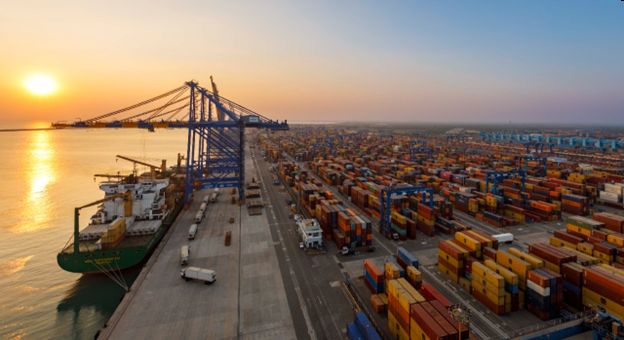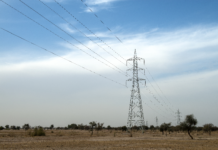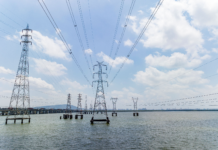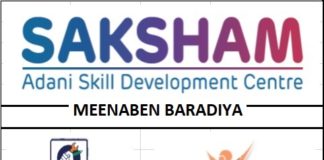Adani Ports cargo volumes zoom to 300 million metric tonnes
India’s largest transport utility on course to achieve 500 MMT by 2025
Ahmedabad, 22 March 2022, Adani Ports and Special Economic Zone Ltd (“APSEZ”), the largest integrated transport utility in India and a part of the diversified Adani Group, has crossed a historic milestone by handling 300 MMT of cargo well ahead of the year end (March 2022). APSEZ has registered unprecedented growth since it started operations just over two decades ago and continues to outperform all India cargo volume growth, with its market share rising rapidly.
“The acceleration of our cargo volumes is a manifestation of our ability to continue to execute on our strategy,” said Mr Karan Adani, CEO and Whole Time Director, APSEZ. “Our network of ports across the Indian coastline coupled with our integrated logistics capabilities, focus on technology enabled digitised operations and, most importantly, the deep relations that we have built with our customers and partners (that include the global shipping lines), are all coming together to make APSEZ a full-fledged integrated ports & logistics platform that augments each other. We anticipate our growth to continue to accelerate given our capabilities that are now best-in-class and the tailwind of a growing Indian economy.”
“This achievement also underlines the ability of APSEZ to adapt to fast paced changes due to global market and geopolitical volatility and continue its journey towards sustainable growth. I must thank our dedicated teams that drive our growth and our great workforce that makes it all happen on the ground. We are confident of reaching our goal of 500 MMT by 2025 and emerge as the world’s largest private ports company by 2030.”
APSEZ has been continuously accelerating the time taken to increase cargo volumes. While it took 14 years to achieve 100 MMT annually (with five ports in its portfolio), APSEZ doubled it to 200 MMT annually (with nine ports in its portfolio) in just the next five years. Now, with 12 ports in its portfolio, APSEZ’s milestone of handling 300 MMT annually has come about in just three years. Remarkably, the three-year journey from 200 MMT to 300 MMT includes the two-year period of global economic slowdown due to the pandemic.
In parallel with ramping up its business operations, APSEZ has also significantly delivered on its commitments to sustainability. Energy and emission intensity has been reduced by around 30% from 2016 levels. Electrification of Rubber Tyred Gantry Cranes (RTGs) has been completed, and that of Quay Cranes and Mobile Harbour Cranes is in progress, with 2023 as the target completion year. Diesel-based Internal Transfer Vehicles (ITVs) are being replaced by electric ITVs. The first batch of 100 electric ITVs is likely to arrive in mid-2022 and the total count is expected to cross 400 in 2023. Another green port initiative is a 50% discount on Port Dues, Pilotage and Berth Hire Charges for ships using LNG as a fuel. With enhanced afforestation and several other green measures already underway, APSEZ is well on its way to achieving its target of carbon neutrality by 2025.
About Adani Ports & Special Economic Zone Ltd.
Adani Ports and Special Economic Zone Ltd (APSEZ), a part of the globally diversified Adani Group has evolved from a port company to an Integrated Transport Utility providing end-to-end solutions from its port gate to customer gate. It is the largest port developer and operator in India with 6 strategically located ports and terminals on the west coast (Mundra, Dahej, Tuna and Hazira in Gujarat, Mormugao in Goa and Dighi in Maharashtra) and 6 ports and terminals on the East coast of India (Dhamra in Odisha, Gangavaram, Visakhapatnam and Krishnapatnam in Andhra Pradesh, and Kattupalli and Ennore in Chennai) representing 24% of the country’s total port capacity, thus providing capabilities to handle vast amounts of cargo from both coastal areas and the hinterland. The company is also developing two transshipment ports at Vizhinjam, Kerala and Colombo, Sri Lanka. Its ‘Ports to Logistics Platform’ comprising port facilities, integrated logistics capabilities including multimodal logistics parks, Grade A warehouses, and industrial economic zones, puts APSEZ in an advantageous position as India stands to benefit from an impending overhaul in global supply chains. The company’s vision is to be the largest ports and logistics platform in the world in the next decade. With a vision to turn carbon neutral by 2025, APSEZ was the first Indian port and third in the world to sign up for the Science-Based Targets Initiative (SBTi) committing to emission reduction targets to control global warming at 1.5°C above pre-industrial levels.







































COMMENTS